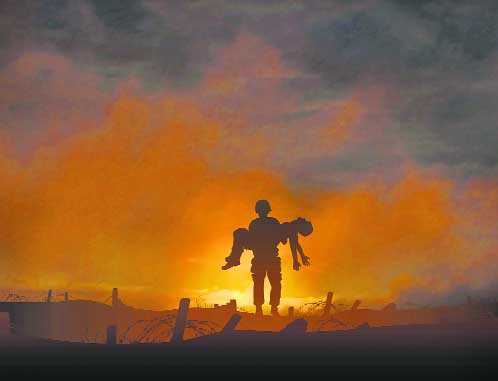On 50th anniversary of the 1965 war, there is little for the martyrs’ families to celebrate. War takes away the best, the bravest of brave and most honourable in the prime of youth. Regrettably, their supreme sacrifices gradually fade away in public memory

OUR alma mater — Sainik School, Amaravathinagar, tucked away in the foothills of Nilgiris — celebrated its golden jubilee in 2012, with military pomp and pageantry. I was amongst the first batch to join the school in August, 1962. Barely had we settled down that during the morning assembly, Principal Col Sahni announced that China had launched a surprise attack on India. As sixth graders, we were too young to understand the complexities of such issues. Soon, however, it was clear that our Army had suffered a humiliating defeat at the hands of the Chinese. As future flag-bearers of the armed forces, this episode left a deep impression on our young minds.Three years later, as we got off with the autumn term, news started trickling in that it was now Pakistan which was on to mischief. By now in the ninth grade, we were well informed, with access to national dailies, BBC broadcasts and regular updates in the school. From the battle accounts and summaries, it was evident that Indian armed forces had gained an upper hand over the opponent right in the initial stages of the conflict. Our morale was sky high.One fateful day, we were shaken by sad news. Ranjit Singh Mann, who was my classmate and shared the same dorm, was informed that his dad, serving in 5 Guards, was reported “missing in action” in the Khem Karan sector, scene of the fierce tank battle. Ranjit was in a state of shock. We all tried to console and convince him not to fear the worst. While the war ended and Prisoners of War were exchanged, there was no news of Ranjit’s father.Over a period of time, Ranjit’s behaviour underwent a drastic change. He became very quiet and frequently suffered from insomnia. His health also deteriorated, impacting the grades. While most of us cleared the National Defence Academy entrance examination, Ranjit failed to make the cut.Sometime later, Ranjit’s dad was declared “killed in action”. It was obvious that Ranjit could not reconcile to his father’s tragic loss. His dream of getting commission in the Army lay shattered. As the eldest of siblings, he also had to shoulder family obligations. The monthly pension his widowed mother received was a mere Rs 96; too meager to make both ends meet. So, unable to carry on with higher studies due to economic constraints, Ranjit dropped out of college and joined the Army as a Havildar. He was now able to continue with studies as also lend support to his family. Once financially stable, he quit and joined the banking service and recently retired as Chief Manager.The other day I happened to touch base with him. Even half a century later, Ranjit and his family still bear deep scars of the tragic loss. While India commemorates the 50th anniversary of the 1965 war, for the martyrs’ families there is little to celebrate.Having seen the ugly side of war, on the battlefield there are “no victors, no vanquished”; only losers. Victory is generally defined by the opposing side in terms of proportionate losses, who suffered less or more. The irony of war is that it takes away the best, bravest of the brave and most honourable in the prime of youth. Regrettably, their supreme sacrifices gradually fade away in public memory. Every time I meet with the near and dear ones of those comrades who went down while accomplishing the assigned missions, their moist eyes stoically defy the adage: “time is a great healer”. Fifty years on, for Ranjit and his kin, the intensity of trauma only stands compounded!
The writer is former Assistant Chief Integrated Defence Staff
